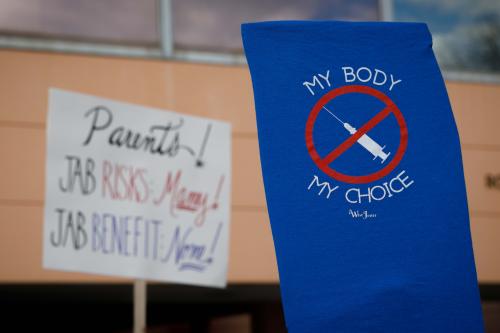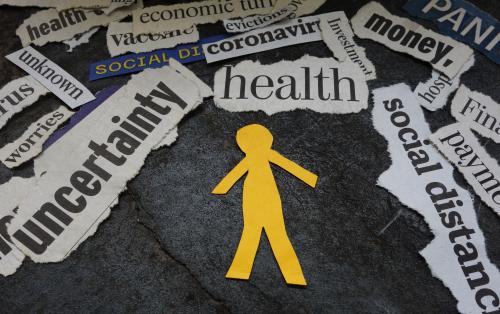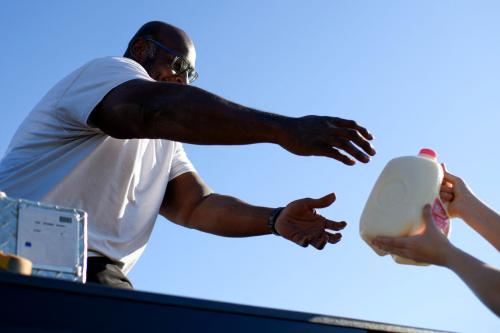The United States has become increasingly polarized and unequal, not only in terms of income and opportunity but also how people feel about their lives. These sentiments matter to economists and other social scientists because feelings such as happiness, optimism, and hope—elements of what researchers refer to as “subjective well-being”—can, when properly measured, predict for both individuals and groups such important outcomes as physical and mental health, productivity, civic participation, longevity, and success in the labor market. Individuals with very low levels of well-being—and in despair in particular—suffer not only poor outcomes on the health, longevity, and productivity fronts, but they also typically avoid civil society, live in loneliness and isolation, and are vulnerable to misinformation, conspiracy theories, and radicalization.
We currently have a crisis of premature deaths caused by suicide, drug overdose, and alcohol-related diseases, all the consequences of high levels of despair. The crisis not only claims over 100,000 lives every year but has resulted in consistent drops in our average life expectancy beginning in 2015. Given the scope and scale of the crisis and the costs that it has both in terms of human life and social cohesion, it has become a threat to our health, our civil society, our democracy, and even national security.
A growing body of evidence suggests that the single most consequential component of subjective well-being is hope, as it is critical to future outcomes for individuals and society. People usually think of hope as an emotion rather than something that can be measured and linked to behavioral, economic, and political outcomes. Economists who study hope—a small group that includes me—define it slightly differently. Hope is not simply the belief or feeling that one’s circumstances will get better: that is optimism. Rather, hope is optimism combined with the belief that one has the agency to make things better. Research suggests that hope, like happiness and other aspects of well-being, has a genetic component and is also shaped by environmental factors such as familial and community support, education, and opportunity. The influence of environment means that policymakers and civic leaders have an opportunity to promote and nurture hope among citizens.
Preventing another generation from falling into despair is essential to our society’s future heath, well-being, civil society, and national security.
My research shows that downward trends in hope are a key factor in the rising numbers of U.S. deaths of despair—a term that encompasses suicide, overdoses, and alcohol-related mortality. We also showed that depression (a sign of despair and lack of hope) preceded deaths of despair among individuals and communities by two to four years, suggesting that well-being metrics could have served as a warning indicator had they been collected regularly.
With collaborators, I have conducted surveys of hope among low-income adolescents in Lima, Peru and St. Louis, Missouri and found that those who have hope for the future are more likely to invest effort in their education and avoid risky behaviors that can jeopardize their health. In addition, in communities where hope is nurtured, people are more likely to thrive.
In contrast, individuals in despair—a condition in which people do not care whether they live or die and lack a narrative for their own future—are not likely to respond to incentives or nudges or take advantage of opportunities to get ahead. More recent research, including my own, finds that individuals in despair are vulnerable to misinformation, conspiracy theories, and radicalization.
In a new article, I provide empirical evidence and review lessons from well-being research and other disciplines—most of which are community based—that suggest possible policies for restoring hope in populations where it has been lost or diminished. I also recommend that social scientists and policymakers should both measure hope as a distinct constituent of well-being and develop interventions that cultivate it. In the United States, preventing another generation from falling into despair is essential to our society’s future heath, well-being, civil society, and national security. Trends surrounding the 2024 election already suggest the risks of avoiding the issue.
-
Acknowledgements and disclosures
The Brookings Institution is financed through the support of a diverse array of foundations, corporations, governments, individuals, as well as an endowment. A list of donors can be found in our annual reports published online here. The findings, interpretations, and conclusions in this report are solely those of its author(s) and are not influenced by any donation.
The Brookings Institution is committed to quality, independence, and impact.
We are supported by a diverse array of funders. In line with our values and policies, each Brookings publication represents the sole views of its author(s).







Commentary
Hope, despair, and long-term outcomes
January 25, 2024